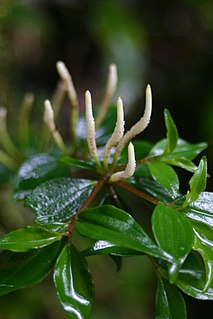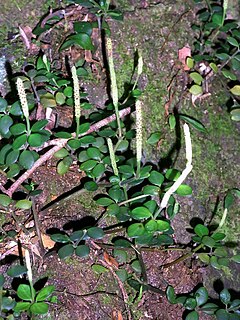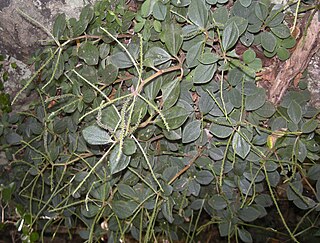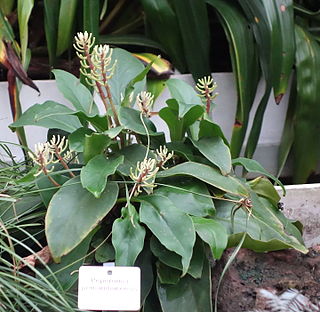
Peperomia is one of the two large genera of the family Piperaceae. Most of them are compact, small perennial epiphytes growing on rotten wood. More than 1500 species have been recorded, occurring in all tropical and subtropical regions of the world, though concentrated in Central America and northern South America. A limited number of species are found in Africa.

The Piperaceae, also known as the pepper family, are a large family of flowering plants. The group contains roughly 3,600 currently accepted species in 5 genera. The vast majority of peppers can be found within the two main genera: Piper and Peperomia.
Peperomia albovittata is a species of plant in the family Piperaceae. It is endemic to Ecuador.
Peperomia disjunctiflora is a species of plant in the family Piperaceae. It is endemic to Ecuador.
Peperomia involucrata is a species of plant in the family Piperaceae. It is endemic to Ecuador.
Peperomia lehmannii is a species of plant in the family Piperaceae. It is endemic to Ecuador.
Peperomia litana is a species of plant in the family Piperaceae. It is endemic to Ecuador.
Peperomia millei is a species of plant in the family Piperaceae. It is endemic to Ecuador.
Peperomia mitchelioides is a species of plant in the family Piperaceae. It is endemic to Ecuador.
Peperomia pachystachya is a species of plant in the family Piperaceae. It is endemic to Ecuador.
Peperomia petraea is a species of plant in the family Piperaceae. It is endemic to Ecuador.
Peperomia tablahuasiana is a species of plant in the family Piperaceae. It is endemic to Ecuador.
Peperomia wibomii is a species of plant in the family Piperaceae. It is endemic to Ecuador.

Peperomia pellucida is an annual, shallow-rooted herb, usually growing to a height of about 15 to 45 cm, it is characterized by succulent stems, shiny, heart-shaped, fleshy leaves and tiny, dot-like seeds attached to several fruiting spikes. It has a mustard-like odor when crushed. The family Piperaceae comprises about a dozen genera and around 3000 species. The genus Peperomia represents nearly half of the Piperaceae with the genus Piper making the rest.

Epidendrum peperomia, the peperomia-like epidendrum, is a species of orchid in the genus Epidendrum.
Foliata, a Latin word meaning leafy, may refer to:

Peperomia wheeleri is a rare species of flowering plant in the pepper family known by the common name Wheeler's peperomia. It is endemic to Puerto Rico, where it is known only from the island of Culebra. It has been become rare because of deforestation and grazing by livestock. It is a federally listed endangered species of the United States.

Peperomia tetraphylla, known as the acorn peperomia or four-leaved peperomia, is a small plant in the pepper family that grows in Australia, Asia, Africa, New Zealand, Lord Howe Island, and other islands in the Pacific Ocean. In New South Wales, it is often seen as an epiphyte or growing on rocks in rainforests. Tiny flowers form on a spike, at the end of the branchlets. The specific epithet tetraphylla is from the Ancient Greek language, meaning "four leaves", though the species may also have whorls of 3.

Peperomia blanda, the arid-land peperomia, is a species of herb in the family Piperaceae. The species has a natural pan-tropical distribution that encompasses Asia, Africa, Australasia, Polynesia and the Americas. The species typically grows as a perennial, somewhat succulent herb to 30 cm in height, though the form varies from prostrate and creeping to up to 60 cm tall depending on environment and genotype. The typical habitat is damp rock crevices and steep stream banks.

Peperomia pernambucensis is a species of plant in the family Piperaceae.








